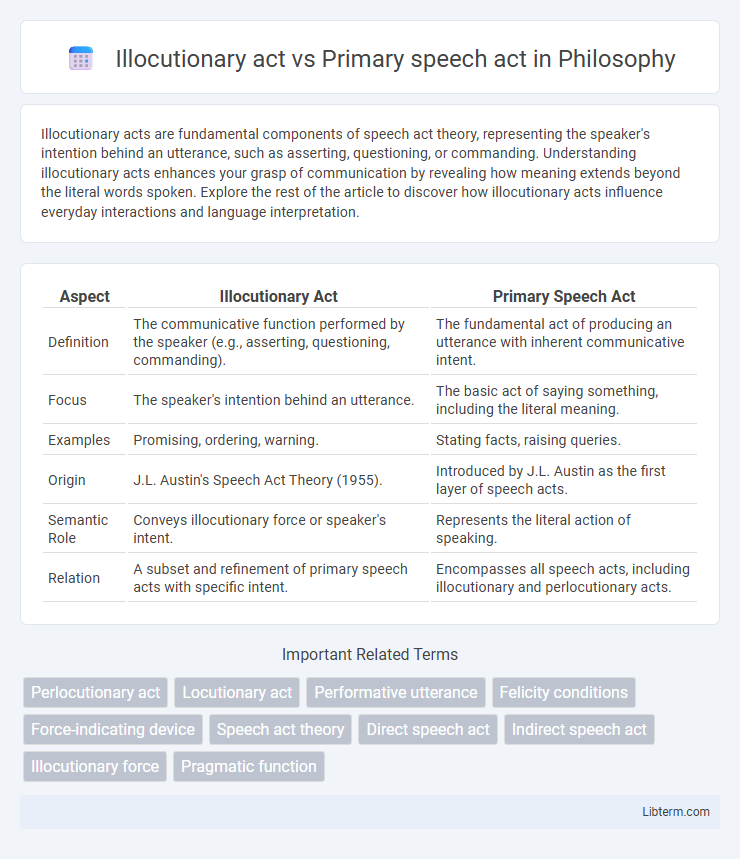Illocutionary acts are fundamental components of speech act theory, representing the speaker's intention behind an utterance, such as asserting, questioning, or commanding. Understanding illocutionary acts enhances your grasp of communication by revealing how meaning extends beyond the literal words spoken. Explore the rest of the article to discover how illocutionary acts influence everyday interactions and language interpretation.
Table of Comparison
| Aspect | Illocutionary Act | Primary Speech Act |
|---|---|---|
| Definition | The communicative function performed by the speaker (e.g., asserting, questioning, commanding). | The fundamental act of producing an utterance with inherent communicative intent. |
| Focus | The speaker's intention behind an utterance. | The basic act of saying something, including the literal meaning. |
| Examples | Promising, ordering, warning. | Stating facts, raising queries. |
| Origin | J.L. Austin's Speech Act Theory (1955). | Introduced by J.L. Austin as the first layer of speech acts. |
| Semantic Role | Conveys illocutionary force or speaker's intent. | Represents the literal action of speaking. |
| Relation | A subset and refinement of primary speech acts with specific intent. | Encompasses all speech acts, including illocutionary and perlocutionary acts. |
Understanding Illocutionary Acts
Illocutionary acts represent the core functions of speech such as asserting, questioning, commanding, or promising, reflecting the speaker's intent beyond mere word meaning. Understanding illocutionary acts involves recognizing how utterances perform actions within a communicative context, differing from primary speech acts that categorize utterances simply as statements, questions, or commands. Mastering illocutionary acts enhances pragmatic competence by interpreting speaker intentions and contextual cues in everyday communication.
Defining Primary Speech Acts
Primary speech acts are defined as the fundamental functions of communication, classified into three main types: locutionary, illocutionary, and perlocutionary acts. Illocutionary acts specifically refer to the speaker's intent expressed through utterances, such as requesting, promising, or asserting. Understanding primary speech acts is essential for analyzing how meaning and intention are conveyed within linguistic interactions.
Key Differences Between Illocutionary and Primary Speech Acts
Illocutionary acts convey the speaker's intention behind an utterance, such as asserting, questioning, or commanding, while primary speech acts refer to the basic functional category of the speech itself, like making a statement, asking a question, or issuing a command. The key difference lies in the illocutionary act emphasizing the communicative intention and effect, whereas the primary speech act focuses on the structural classification of the speech. Illocutionary acts are considered the real actions performed via speaking, whereas primary speech acts are broader categories that include locutionary and perlocutionary acts as well.
Theoretical Foundations: Austin and Searle
Illocutionary acts, as defined by J.L. Austin, represent the performance of an action through speaking, such as asserting, questioning, or commanding, forming the core of speech act theory. John Searle expanded this foundation by categorizing primary speech acts into assertives, directives, commissives, expressives, and declarations, emphasizing their function in communication and intention. The theoretical distinction highlights that illocutionary acts involve the speaker's intent and the act performed, while primary speech acts focus on the broader classification of these communicative actions.
Functions of Illocutionary Acts in Communication
Illocutionary acts serve crucial functions in communication by expressing the speaker's intention, such as asserting, questioning, commanding, or promising, thereby enabling effective interpersonal interaction. These acts perform speech functions that go beyond mere information delivery, influencing the listener's response and social dynamics. Unlike primary speech acts that identify the basic action type of an utterance, illocutionary acts emphasize the communicative purpose and force behind the expression, facilitating understanding and cooperative dialogue.
Primary Speech Act: Scope and Examples
Primary speech acts represent the fundamental intention behind an utterance, classified into three main types: locutionary, illocutionary, and perlocutionary acts. The scope of primary speech acts centers on the speaker's communicative intent, such as asserting, questioning, or commanding, which drives the meaning and function of the speech. Examples include making statements (assertives), asking questions (interrogatives), and issuing commands or requests (directives), which shape the core interaction between speaker and listener.
Illocutionary Force and Communicative Intent
Illocutionary acts embody the illocutionary force, representing the speaker's intended communicative function, such as asserting, questioning, or commanding, which drives the interaction's pragmatic meaning. In contrast, primary speech acts categorize utterances based on their explicit function but may not fully capture the underlying illocutionary force that conveys the speaker's true communicative intent. Understanding illocutionary force is essential to interpreting the implicit intentions behind speech, highlighting the nuanced relationship between linguistic form and pragmatic purpose.
Contextual Factors Influencing Speech Acts
Illocutionary acts involve the speaker's intention behind an utterance, such as asserting, questioning, or commanding, while primary speech acts represent the main function of the utterance in context, like making a request or giving an order. Contextual factors influencing speech acts include the social relationship between participants, cultural norms, and situational context, which shape the interpretation and appropriateness of the speech act. Understanding these factors is essential for accurately decoding meaning and intent in communication.
Practical Implications in Everyday Language Use
Illocutionary acts represent the intended function of an utterance, such as asserting, questioning, or commanding, while primary speech acts categorize statements by their basic communicative purpose (e.g., declarative, interrogative, imperative). Understanding the distinction helps in interpreting the speaker's intent beyond literal meaning, crucial for effective communication in daily interactions. This awareness enhances pragmatic competence, reducing misunderstandings by aligning responses with the intended illocutionary force rather than the surface-level sentence type.
Comparative Analysis: Illocutionary vs. Primary Speech Acts
Illocutionary acts represent the intended communicative function behind an utterance, such as asserting, questioning, or commanding, while primary speech acts combine illocutionary force with contextual purpose, emphasizing the speaker's main intent. Illocutionary acts focus on the speaker's intended meaning within the conversational context, whereas primary speech acts involve the primary function that the utterance serves in communication, often highlighting pragmatic aspects. The comparative analysis reveals that illocutionary acts are a subset of primary speech acts, with primary speech acts encompassing broader pragmatic intentions and contextual implications.
Illocutionary act Infographic

 libterm.com
libterm.com